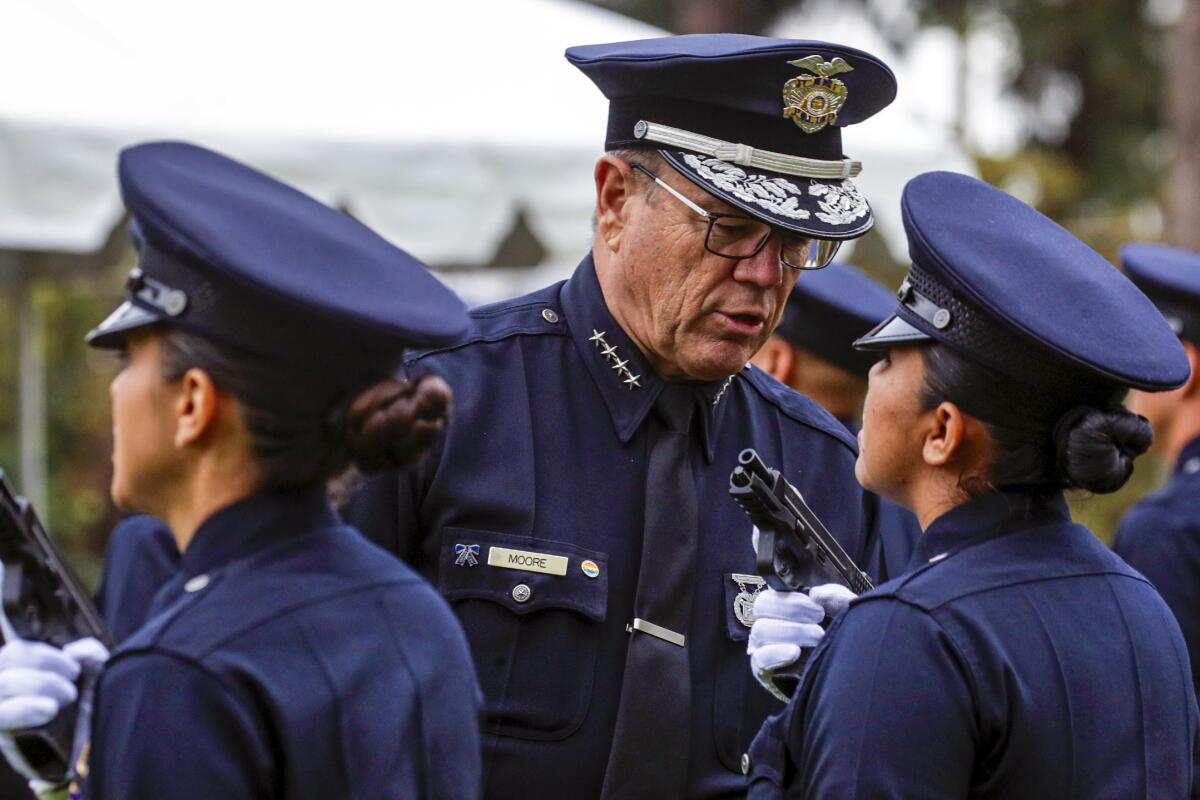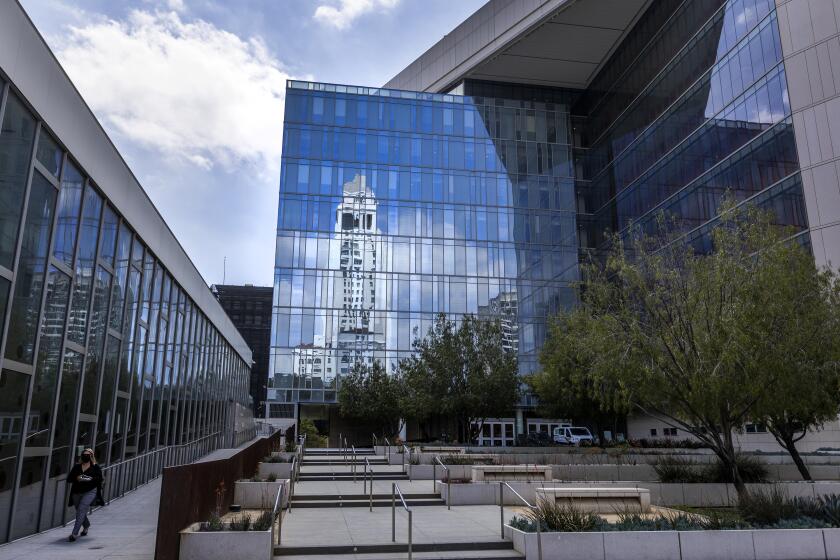Recent controversies test LAPD Chief Michel Moore in the final years of his tenure

- Share via
While Los Angeles Police Chief Michel Moore grappled with the LAPD’s latest gang scandal last week, another crisis was brewing on the 10th floor of department headquarters.
Just days before, an officer had accused Assistant Chief Al Labrada of stalking her using an Apple AirTag — the same style of GPS tracker department sources say Mission Division gang officers used for surveillance of suspects without the required search warrants. Labrada has since been put on administrative leave, pending the outcome of a criminal investigation.
For Moore, the allegations against a member of his command staff renewed questions about management and oversight of the nation’s third-largest police department as he winds down his term. It’s the latest in a string of embarrassing scandals in recent months, including gang officers accused of theft, illegal stops and searches, senior staff engaged in inappropriate relationships with subordinates and the inadvertent release of photos of undercover officers.
In an interview this week, Moore acknowledged the recent controversies had shaken public trust in the department. But he said they were the result of “individual failures” and not, as some have argued, symptoms of deeper problems with the department.
“I don’t see a cultural issue there. I don’t see something that the organization is facilitating, because as soon as the actions were identified, we reacted immediately,” Moore told The Times, adding: “I will say that [regarding] recent events involving senior members of this organization, obviously that’s disappointing, when you look at people ... you thought were qualified for taking the reins.”
Moore has been defensive about the Mission Division gang scandal, repeatedly insisting at commission meetings and in news interviews that the misconduct identified had been confined to one unit — even as some in his own organization suggested the problem of officers deactivating their body-worn cameras was widespread and could have been caught sooner.
An LAPD assistant chief is placed on leave after being accused of stalking by an officer he was romantically involved with, Police Chief Michel Moore said.
That surprised former Police Commissioner Rob Saltzman, who said “it’s unclear how seriously the department took looking at other areas to see if the same problem was occurring.”
Saltzman said Moore’s track record on accountability was one reason he voted for him in 2009 to succeed William Bratton, over Charlie Beck, who eventually got the job. And while he credited Moore with inviting federal authorities to investigate Mission, Saltzman said his response echoed that of some of his predecessors who sought to minimize the scope of past scandals by blaming them on the actions of a few officers.
“In my view, the department’s response should be to come clean,” he said, “this is what happened, this is how it happened, this is what we’ve done to keep it from happening ever again.”
Equally “troubling,” Saltzman, said, were reports of senior staff violating the department’s policy against sexual relationships with lower-ranking officers.
Moore’s comments come a week after he placed Labrada on leave. Labrada remains the subject of a criminal investigation by Ontario police, after an LAPD officer who works in the training division accused him of tracking her movements, according to law enforcement sources who requested anonymity because they were not authorized to publicly discuss the probe. Labrada and the woman had had a relationship that ended recently, the sources said.
The Times is not naming the officer because she is an alleged stalking victim. She is expected to file a claim against the city this week, a precursor to eventually filing a lawsuit. Labrada has denied the allegations and said he is weighing his legal options.
The episode marks a dramatic fall for Labrada, who was considered by some to be a potential candidate to replace Moore when he retires. On Tuesday, several people called in to the Police Commission meeting to support Labrada, who they said had made inroads with largely Latino communities when he was a captain in Hollenbeck Division.
Labrada’s case bears striking similarities to that of another assistant chief under Moore, Jorge Villegas, who retired abruptly in 2019 after sources told The Times he was having an improper sexual relationship with a female subordinate.
Villegas’ case resurfaced earlier this year in a court filing from a former LAPD commander who is suing the department, alleging the existence of a culture of debauchery and favoritism that dates back years and reaches into the LAPD’s upper echelons.
Other department controversies have played out far from the public eye. According to multiple LAPD sources, two other senior officials — a captain and a commander, both male — were transferred to assignments in the San Fernando Valley after being caught sleeping with subordinates. The relationships were consensual, but may have violated policy against sexual relationships with lower-ranking officers, according to the sources who agreed to speak on the condition of anonymity.
That so many instances of bad behavior involve senior staff is concerning, former Police Chief Bernard Parks said, adding that if nothing else, they call into question Moore’s judgment in promoting people with “little maturity or … little integrity.” And the decision to quietly transfer the two senior officials, Parks said, only feeds into a commonly held belief among the rank-and-file that senior officers who are well-connected will not face severe discipline when accused of misconduct.
“Those are things that you would expect on the lower level with less senior officers and less mature officers,” Parks said. “You’re not obligated to promote people just because they’re on the list. And the fact they may’ve squeezed through some with sordid backgrounds — don’t think that this won’t come back to haunt you.”
The growing controversy involving the Mission Gang Enforcement Detail, whose suspected wrongdoing has triggered a separate FBI investigation, has stirred speculation that the issues under scrutiny are more widespread than the department is letting on.
As with past scandals involving specialized units, it potentially could affect scores of criminal cases in which the involved officers played a role.
LAPD officials say a total of 15 officers have been implicated so far. Two, who haven’t been identified, have been directed to a disciplinary hearing, known as a board of rights, facing possible termination. Two other officers, one sergeant and one lieutenant have been assigned home pending the investigation. An additional eight officers and one sergeant are on restricted duty, according to a department spokesperson.
Moore defended the department’s response, saying he had ordered audits of officers’ body camera use and was strengthening internal systems for flagging problematic behavior. While declining to go into details about potential discipline, he stressed that he had addressed the allegations against senior staff as soon as he learned about them.
At the same time, he said, it’s unrealistic for an agency with 12,000 employees not to expect “instances in which we fall short.”
“We’re human,” he said. “We are part of society like everyone else.”
In a departmentwide email, LAPD Chief Michel Moore included a list of sensitive positions and asked other officers to self-identify if they wished to remain anonymous.
Just how politically damaging the recent scandals will be for Moore remains to be seen.
With crime currently trending downward, he continues to have the public support of Mayor Karen Bass and the Police Commission. In January, Moore was reappointed to a second five-year term over the concern of critics who argued that the scope of scandals that have plagued the department during Moore’s tenure offers a poor track record for any leader.
Former Police Commissioner Steve Soboroff said Moore has always proved himself capable of passing “tests like and more difficult than this.”
“I don’t have any reason to doubt that he will pass this — if you will consider these two items a test, Labrada and Mission — that he will show what I’ve always found to be very thorough and excellent leadership and instinct,” Soboroff said.
Reappointing Moore, his critics argued at the time, meant sticking with a leader who carries the baggage of past political stumbles and who has repeatedly been bruised professionally by a series of challenges and scandals that confronted the department during his first term — including surging violent crime, the department’s response to the COVID-19 pandemic, unjustified police shootings, a bomb squad’s detonation of a fireworks cache that destroyed a South L.A. neighborhood, the botched police response to mass protests in 2020 and Moore’s own blunders in leading responses to those incidents and talking about them with the public.
Some of those concerns resurfaced on a recent afternoon, when activists held a news conference outside of police headquarters calling for Moore’s ouster, while criticizing city leaders for their silence about the department’s troubles. At the commission meeting that followed, one speaker after another painted a portrait of a department that had fallen into disarray under Moore’s leadership.
“At what point do you say to yourself, that’s too much. At what point do you say to yourself, let’s do an honest evaluation, maybe it’s time to go,” Greg “Baba” Akili, a longtime Moore critic, told commissioners during the meeting.
For most of his first term as the city’s top cop, Moore drew praise from some leaders as a top-notch policing executive with the rare skillset needed to run the LAPD, a massive, multibillion-dollar organization that is under an intense microscope.
For the record:
12:58 p.m. Oct. 19, 2023An earlier version of this story cited a Loyola Marymount University voter survey. Los Angeles residents, not voters, were surveyed.
And a Loyola Marymount University survey of Los Angeles residents showed stronger satisfaction with the LAPD’s overall performance than in recent years, even if swaths of the population see disparities in the way the department polices Black and Latino residents.
Before his reappointment, Moore said he would serve for only two to three years before turning the department over to a new chief ahead of the 2028 Olympic Games, which would start soon after a full second term would expire. He said he would spend the next few years laying the groundwork for a succession plan in the department’s upper echelons.
William Briggs, a police commissioner, said he is taking the recent controversies “very seriously” and wants to ensure the thoroughness of parallel investigations by the department and inspector general’s office.
“If someone is guilty of the allegations, then I think the appropriate discipline should be meted out without question. And that goes for the gang unit, and that goes for the assistant chief and any other incident of impropriety in the department,” said Briggs, a holdover appointee of former Mayor Eric Garcetti. “We ask our chief executives to handle more than one crisis … and still advancing policies that they want to see get passed and get through.
“If I didn’t have faith that he can do that, then we’d be having a different conversation.”
Times staff writers Richard Winton and Kevin Rector contributed to this report.
More to Read
Sign up for Essential California
The most important California stories and recommendations in your inbox every morning.
You may occasionally receive promotional content from the Los Angeles Times.













